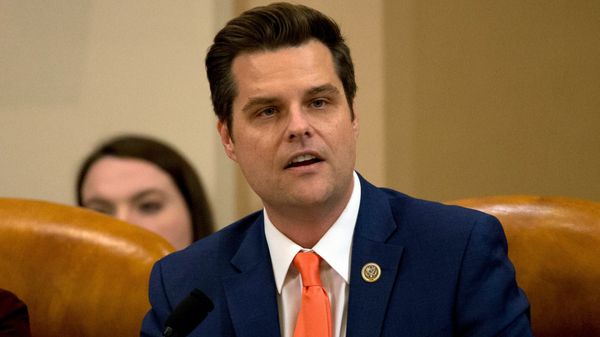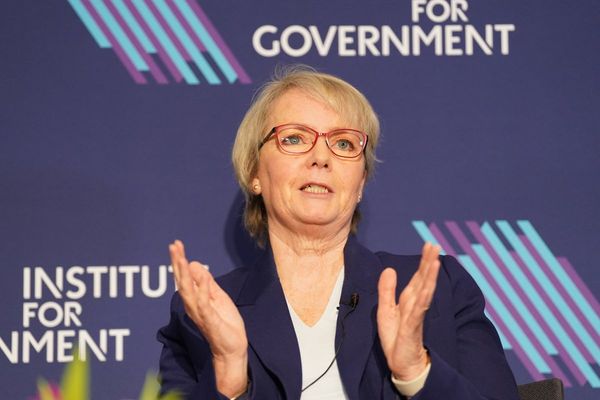
Counting is under way in Indonesia after millions of people turned out to choose a successor to Joko Widodo, the hugely popular president known as Jokowi, who is barred from running for a third term under the constitution.
The frontrunner is Prabowo Subianto, the only general ever to be given a dishonourable discharge from the country’s armed forces.
Widodo’s archrival in the last two elections, 72-year-old Prabowo later became his defence minister and has sought to soften his strongman image throughout the two-month campaign.
He’s been helped by a cartoon portraying him as a “cuddly grandpa” and having Gibran Rakabuming Raka, Jokowi’s eldest son, as his running mate after a controversial Constitutional Court ruling on age limits last year.
While the president has not formally endorsed the pair, his unofficial support has boosted their bid for office.
“Jokowi is the single most important person not running for office in this campaign,” Greg Fealy, an emeritus professor at the Australian National University and an expert in Indonesian politics, told Al Jazeera.
“Jokowi is extraordinarily popular, with a more than 80 percent approval rating, and Prabowo is the main beneficiary of that.”
The other candidates are academic turned education minister and Jakarta governor Anies Baswedan, and Central Java Governor Ganjar Pranowo from the Indonesian Democratic Party of Struggle (PDI-P), the biggest party in parliament and Jokowi’s party in 2014 and 2019.
Heavy overnight rain caused flooding in some places and led to the temporary closure of some polling stations, but voting generally went smoothly.
After casting his ballot in Bogor in Western Java, Prabowo was in good spirits.
“Rain brings blessings,” he said. “Hopefully everything goes smoothly. We await the results.”

Anies, who voted in South Jakarta, appeared to reference concerns about the continued persistence of vote buying, as well as the risk of unrest. In 2019, Prabowo challenged Jokowi’s victory and two days of deadly rioting.
“I want to underline that we want honest and fair elections and that the community also accepts the results,” he said.
Young voters
In a country that celebrates election day as a “festival of democracy”, some polling stations were decorated with pink and red hearts for Valentine’s Day.
Queues of voters were enthusiastic. Turnout was more than 80 percent at the last election in 2019.
In the beach town of Sanur on the island of Bali, 18-year-old Gunghar was voting for the first time.
His heart “pounded,” as he placed his vote, he said.
“Young people want major changes in Indonesia,” he told Al Jazeera without revealing which candidate he had backed. “We want Indonesia to be the most impactful country in the world.”
Young people make up just over half the total number of voters and are expected to have a substantial impact on the result.
In Jakarta, Marcellina Pujowati was concerned about unemployment which stands at just under 20 percent for those aged 15-24.
“The job situation is most important to us young voters because nowadays it is hard to find a job,” she said.
Before casting her ballot, Marcellina said she also wanted a president who would “make Indonesia better” by improving the political and economic situation in the country.
Over in Beijing, 20-year-old Maria Jessica Fernanda Santoso was voting for the first time.
She said she had decided to back Prabowo and Gibran because they offered the best chance of a continuation of Jokowi’s policies.
“I feel it is important to continue and finalise the milestones that President Jokowi has achieved during his administration,” she told Al Jazeera. “I am confident that [Prabowo-Gibran] has the potential to continue these efforts better.”

The pair have promised to continue with Jokowi’s controversial plan to relocate the country’s capital to a site on the island of Borneo, as has the PDI-Ps Ganjar. Anies, meanwhile, is seen as a candidate for change and has said he will stop the move.
Students and civil society groups have raised concerns about Prabowo’s dark past.
A former Kopassus special forces commander, the 72-year-old is the only candidate with links to the hardline regime of former leader Soeharto, once his father-in-law.
He was dishonourably discharged in 1998 after Kopassus soldiers kidnapped and tortured Soeharto’s political opponents. Of 22 activists kidnapped that year, 13 remain missing. And while Prabowo never faced trial, several of his men were tried and convicted.
He has also been accused of human rights abuses in East Timor, which won independence from Indonesia amid the collapse of the Soeharto regime, and its troubled eastern region of Papua.
For all that, most Indonesian voters seemed unconcerned.
Ben Bland, the head of the Asia Pacific programme at Chatham House in London, said that probably reflects Indonesians’ growing confidence in their democracy and institutions’ ability to constrain a “strong willed” president.
Indonesians are also voting for a new parliament and thousands of local representatives.
At an online election discussion last week, he also noted the “tendency in Indonesia for grand coalitions” to be formed after elections, further limiting a president’s power.
“Whoever wins will be looking to build a big tent coalition,” he said.
As the count progresses, all eyes will be on the 50 percent threshold that is necessary to avoid a run-off in June.
Ten years ago, Jokowi and Prabowo were bitter rivals. With Jokowi’s son now by his side, Prabowo appears to be facing his best-ever chance to become president.
“It’s quite a turn of fate,” political analyst Tobias Basuki told Al Jazeera. “It could be third time’s the charm for Prabowo.”
With reporting by Madeline Coad in Sanur, and Adam Hancock and Randy Mulyanto in Jakarta







